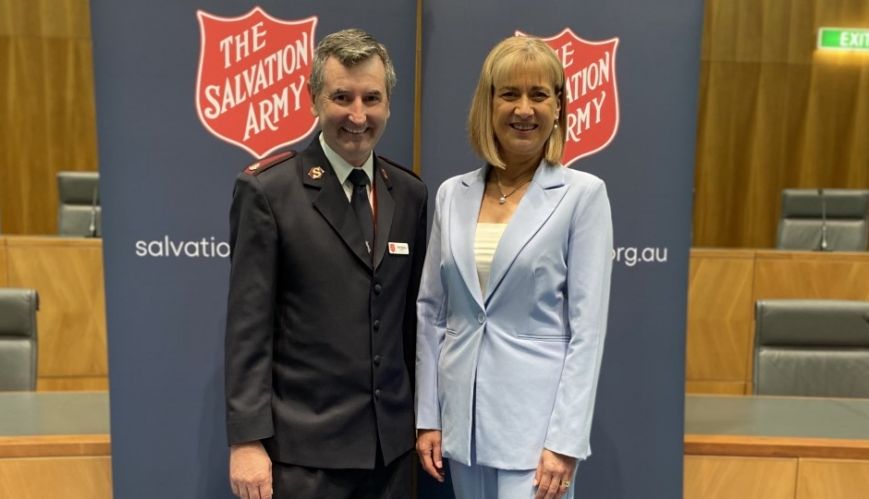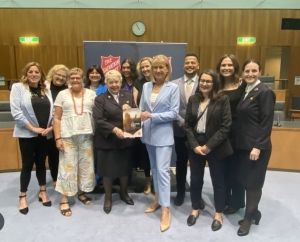Family violence model of care launched in Canberra

Family violence model of care launched in Canberra
13 December 2022
The Salvation Army Head of Government Relations Major Paul Hateley and the Federal Assistant Minister for the Prevention of Family Violence and Social Services, the Hon Justine Elliot MP, at Parliament House in Canberra for the launch.
The Salvation Army launched the Family and Domestic Violence Model of Care at Parliament House in Canberra on 1 December. The purpose of the National Family Violence Model of Care is to drive consistent best-practice responses to family violence across The Salvation Army.
The launch was part of the annual 16 Days of Activism against Gender-Based Violence, which runs from 25 November to 10 December. The international campaign was started by the Women’s Global Leadership Institute in 1991, and now runs annually. The aim is to call for the prevention and elimination of violence against women and girls.
The launch was attended by the Federal Assistant Minister for the Prevention of Family Violence and Social Services the Hon Justine Elliot MP, Major Jenny Begent, Head of Department, Social Mission, and Lorrinda Hamilton, General Manager Family Violence Services. The Assistant Commissioner for Domestic Family and Sexual Violence Jessica Guthrie was also in attendance. Members of the Family and Domestic Violence Stream, Head of Government Relations and members of the Policy and Advocacy and Media Relations teams were also in attendance.
 Head of Social Mission Major Jenny Begent and MP Justine Elliot (both holding report) and the delegation at the Canberra launch.
Head of Social Mission Major Jenny Begent and MP Justine Elliot (both holding report) and the delegation at the Canberra launch.
The new model of care is informed by an overarching conceptual framework that acts as a road map, drawing connections between an evidence-based understanding of family violence and the key concepts that enable effective action to prevent and respond to this problem. These key concepts are human rights, intersectionality, cultural safety, trauma-and-violence informed approach, and a person-centred practice
Developed in collaboration with No to Violence, AWAVA, Safe and Equal and victim-survivors, the model of care acknowledges and demonstrates evidence of the disproportionate harm of gender-based family violence predominantly perpetrated by men against women and children and simultaneously recognises the significant impacts of family violence across a broader range of relationship contexts. Therefore, the model of care is inclusive of heterosexual intimate relationships, LGBTIQA+ intimate relationships, and various immediate family, extended family, kinship, and carer relationships.
The Salvation Army’s National Family Violence Stream plays a critical central role in leading the whole-of-organisation response to family violence as part of their core, everyday business. The Model of Care provides a best practice model for specialist family violence services. The Salvation Army’s commitment to ending family violence is part of a broad and complex system working across the continuum of primary prevention, secondary prevention, and tertiary prevention.
The Salvation Army acknowledges the strength and resilience of all who are impacted by family violence including adult and child victim-survivors, their family, and friends.